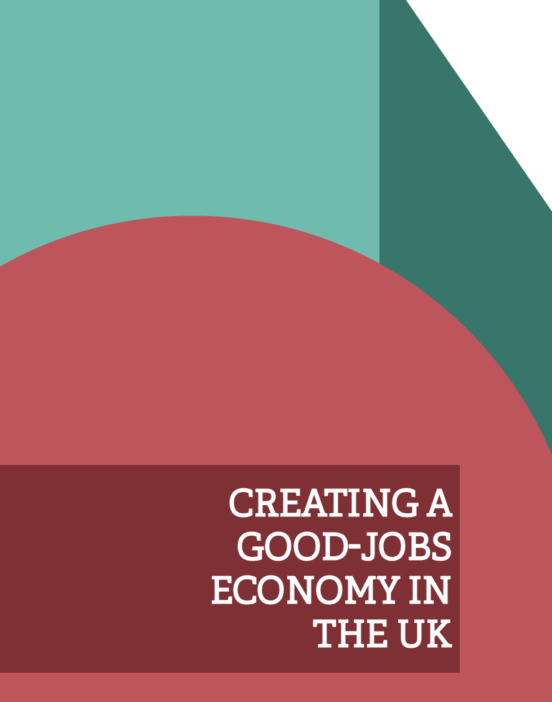Creating a Good-Jobs Economy in the UK

The United Kingdom has a good-jobs challenge. The British economy falls short on inequality metrics on the one hand, and average household disposable income levels on the other. Real pay fell at the fastest rate in 20 years in 2022 and estimates suggest that real household disposable income is set to fall by the highest amount in recorded history this year.
Meanwhile, low-paid workers experience greater job insecurity and lower job satisfaction, facing twice the risk of job loss compared to higher-paid workers. 22 percent are in precarious working arrangements, such as zero hours contracts or variable hours, in contrast to only 9 percent of higher-paid workers.
The regional disparities that underpin this good-jobs problem is also well documented. Cities outside of London and the South East underperform the UK average in productivity, as well as underperforming compared to their European counterparts of a similar size. Regional patterns in productivity play out in job quality, as we might expect. Eight of the top ten highest-scoring local authorities in the Institute for the Future of Work’s Good Work Monitor are based in the South East.
The UK is hardly alone in facing this challenge. Deindustrialisation, globalisation and declining protections for labour have created conditions across developed economies whereby productive technologies are held in a small number of high-performing firms and do not diffuse across all parts of the economy. We see this in the UK’s much discussed long tail of low productivity firms. The effect of this economic dualism is the proliferation of ‘bad jobs’.
Calls to renew manufacturing are not an adequate response to this phenomenon. Automation and labour-saving innovations have resulted in lower levels of job creation in advanced manufacturing sectors. Even those countries that have maintained strong industrial sectors, like South Korea or Germany, have seen a decline in manufacturing employment as a share of total employment. Services have catalysed the vast majority of new net job creation in the private sector over the past forty years. Highlighting the importance of services in industrial policy runs counter to prevailing sentiment that continues to prioritise manufacturing – but it is crucial if we are to think clearly about a good-jobs agenda for the decades ahead.
What do we mean by ‘good jobs’? Work that pays well enough to allow for a reasonable living standard, provides stability and security, with opportunities for career progression. Over time, good jobs equip workers with opportunities for self-development, responsibility, purpose and fulfilment. Good jobs also provide significant positive externalities: firms that produce them help to create thriving communities. Conversely, ‘bad jobs’ come with a range of social and economic costs that are not sufficiently priced in firms’ decision-making. Adverse social consequences can take the form of exclusion, fractured families, addiction, and crime as well as reduced mental and physical well-being.
Creating good jobs has not been a core pillar of national government strategies across the OECD, not least in the UK Treasury. But that is starting to change. The Biden administration’s Good Jobs Challenge and the Scholz government’s focus on the dignity of work provide two recent examples of how this shift in economic focus is playing out in other countries. A number of countries have developed a collaborative social partnership approach in response to disruption in the labour market: for instance, the Danish Disruption Council, Germany’s Industry 4.0, the Swedish Job Security Council, the New Zealand Future of Work Forum.
These developments form part of a wider retooling of economic strategy that focuses remedies not only on the pre-production (e.g. schooling) or post-production (e.g. taxation) stages of the economy, but also more squarely targets production itself. The aim is to improve the quality of jobs across all regions of the UK and across all segments of the workforce.
Following the approach in Rodrik and Stantcheva, we argue that four elements should underpin any good-jobs mission in the UK. First, a series of active labour market policies at the local level that are designed in partnership with firms to increase skills and employability. Second, industrial policy at the regional level that creates a suite of customisable public inputs for firms that go beyond tax incentives and subsidies. Third, innovation policy at the national level that explores how technology can complement labour as well as replace it. Lastly, an approach to international trade that enables the maintenance of high domestic labour and social standards.
Taken together, these four pillars combine to form a good-jobs strategy. While much of the emerging ‘good-jobs’ agenda has its roots in the United States, this essay explores how the model that underpins it can be adapted to the particular circumstances of the UK economy. We sketch out what a good-jobs economy could look like in the context of governance, innovation and growth in the UK.
Download a PDF of the full essay
Steering Economic Change is a series of externally-written policy essays, each of which aims to provoke public debate on a specific policy area, and sketch out an agenda that will contribute towards the wider goal of the UK becoming a higher growth, lower inequality economy.
The essays cover topics ranging from the role of smarter regulation in
supporting economic growth, ensuring that the goal of ‘good jobs’ is embedded
in our national industrial strategy, and the role of the higher education sector in
providing the skills needed to power our services dominated economy.
They are written by a range of leading economists and policy experts, and reflect
the views of the authors rather than those of the Resolution Foundation, the
LSE or The Economy 2030 Inquiry.
They have been commissioned and edited by Gavin Kelly (Chair of the
Resolution Foundation and member of the Economy 2030 steering group) and
various members of The 2030 Economy Inquiry team.